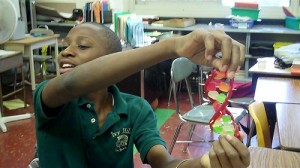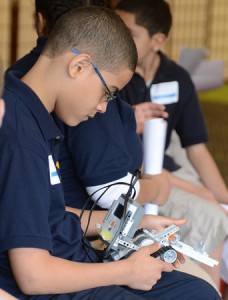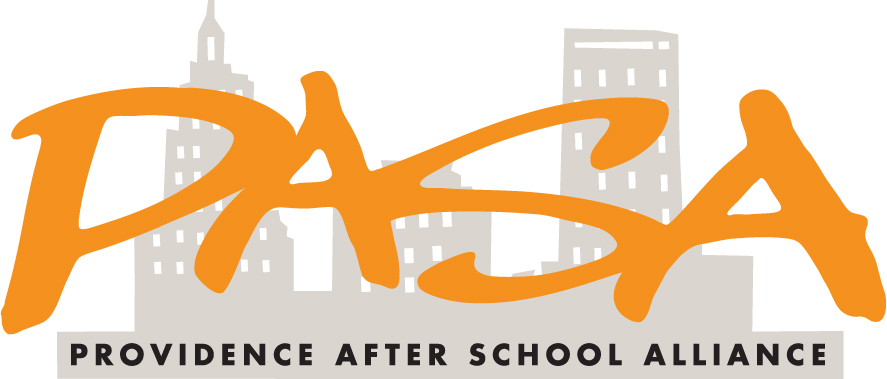Above: AfterZone Summer Scholars Learn Environmental Science, Hands-On
Earlier this month, Valerie Strauss posted an intriguing and controversial education manifesto on her blog. Entitled “Why Kids Hate School—Subject by Subject,” the post outlined Robert Schank’s incendiary reasons for why nearly every subject taught in the school day is “a complete waste of time.” As you might imagine, Schank—an artificial intelligence theorist, education reformer, and author of Teaching Minds: How Cognitive Science Can Save Our Schools—ruffled more than a few feathers in the education field.
His list, meant to provide students with empowering reasons for reform, is actually a pretty witty and enjoyable read, though we can understand why a passionate English teacher with a love of 19th Century literature probably wouldn’t chuckle.
While his treatment of school subjects jangled some nerves, our friends over at Citizen Schools posted their own response about how his statements also reinforced some of what PASA and others see in the after-school and expanded learning field: If you combine school and community resources to engage young people in hands-on, real-world applications of learning, they come alive with curiosity and engagement.
You don’t have to throw the periodic table out all together, you just need to make it relevant to real life!
This originally appeared on their inspirED blog.
By Elizabeth Ward

1. Chemistry. Schank doesn’t believe kids should be forced to memorize things they’ll never use in their daily lives, like the periodic table. I know I’ve never used it and I got an A in chemistry. But when taught in a practical environment, chemistry can be extremely worthwhile. Middle school students in New York learned how to become forensic scientists in a “CSI” apprenticeship. They collected samples of chemicals from a fictional crime scene and tested them for evidence. Chemists examine the interactions between substances and make hypotheses. That’s exactly what the students learned to do in CSI, without memorizing NaCl or NH3.
2. History. Schank believes that history textbooks tell a biased version of the facts. Sometimes they do. But looking to history is a great way to address modern issues. In an apprenticeship called “Champions for Change,” students research an issue affecting their community such as poverty, racism or illiteracy. In doing so, they learn from the mistakes of the past and work on finding practical solutions. Instead of just reading about history, they’re actually preventing it from repeating itself.
3. English. Schank is not a fan of book reports or term papers. He is however, a fan of learning how to write well. I was the random kid who happened to love writing papers, but I much preferred writing on topics I truly cared about. Kids can become excellent writers by producing a school newspaper like they did in Henderson, North Carolina in an apprenticeship called “Hot Off the Press.” Led by the editor of their local newspaper, they got to practice writing every day and produce something meaningful while doing so.
 4. Biology. Schank sees this subject as one worth knowing, but the way they teach it in high school, “can’t get any sillier.” Instead of amoebas and dissections, he recommends teaching kids how to take care of their bodies and how to stay healthy. The National Institute of Environment Health Sciences teamed up with Citizen Schools to lead an apprenticeship called “Happy Lungs, Happy Living.” The kids took a deep dive into the human respiratory system and learned how the lungs are effected by the environment.That is definitely worth knowing.
4. Biology. Schank sees this subject as one worth knowing, but the way they teach it in high school, “can’t get any sillier.” Instead of amoebas and dissections, he recommends teaching kids how to take care of their bodies and how to stay healthy. The National Institute of Environment Health Sciences teamed up with Citizen Schools to lead an apprenticeship called “Happy Lungs, Happy Living.” The kids took a deep dive into the human respiratory system and learned how the lungs are effected by the environment.That is definitely worth knowing.
5. Economics. “This subject in high school is beyond silly. Professional economists don’t really understand economics,” Schank says. But learning how to balance a checkbook and how to set a personal budget are definitely important lessons. A group of students in Massachusettsbecame money savvy in an apprenticeship called “Invest Like a Millionaire” led by Fidelity Investments. They learned the fundamentals of budgeting and how to spend smartly. I had to learn that the hard way.
6. Physics. Even Schank recognizes that we use physics every day of our lives. But he says the right things just aren’t being taught. He said, “The Wright Brothers did not have any theory of flight. They simply tinkered with stuff until their plane flew.” Speaking of tinkering, kids in California did the same with kites until they flew in an aerodynamics apprenticeship led by IBM. Just like the Wright Brothers, they saw physics instead of memorizing it.
